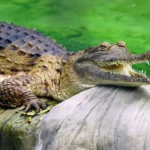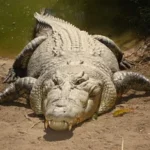If you’ve read our ‘shark’ category, you’ll know that we dedicated an article to shark teeth. And this time, it’s all about crocodile teeth and whether or not they grow back.
Crocodiles, like sharks, can regrow their teeth. Crocodiles, in fact, never run out of teeth until the very last day of their lives. This is because crocs use their strong teeth to tear their prey apart, losing some of their teeth in the process. Then, however, they regrow them, and the process continues throughout their lives.
If you look up the inside of “crocodile teeth images,” you’ll notice that these reptiles have more teeth inside their teeth. This occurs because the replacement teeth grow within the main set of teeth, preventing crocs from going completely toothless when a tooth is torn out.
Crocs are not the only animals that regrow their teeth. For example, kangaroos, elephants, and manatees have multiple sets of substitute molars that develop as they wear them out over their entire lifespan.
What kind of teeth do crocodiles possess?
Crocodiles are one of the most powerful predators on the planet.
Crocodiles have a heterodont tooth structure. They have distinguishable canine, incisor, and molar teeth. Despite having so many teeth, crocs don’t chew their food. Instead, they consume large pieces of meat by tearing apart the flesh. These large reptiles can kill fish, birds, mammals, and other prey with the help of their sharp teeth.
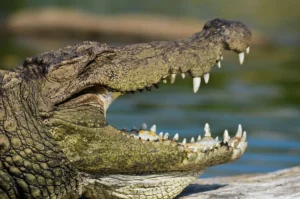
Want to know the number of teeth popular croc species possess? Here is a list for you.
- Saltwater crocodile
66 pointed teeth- 36 on top, and 30 on the lower jaw
- Freshwater crocodile
68-72 sharp teeth
64 to 68 sharply pointed teeth
- American alligator
It has a broad snout and between 70 and 80 teeth that stick out of its mouth.
- Gharial
A gharial has an amazing array of between 106 and 110 interlocking sharp teeth.
- Black caiman
Around 78–82 teeth- 14 on the upper and 21-22 on the lower jaw.
Do crocodiles lose their teeth?
Crocodile teeth are indeed something to be frightened of. And why not? After all, they have extremely powerful jaws and sharp teeth that can pierce through any skin.
Crocodiles, in their hunting process, often lose their teeth. It is a fact. But they do not live without teeth, as they grow them back. All thanks to their replacement teeth already growing inside the main set of teeth.
Crocs naturally lose their teeth when they bite something hard, only to regrow them. Unfortunately, as humans progress, these reptiles are facing difficulties. According to recent news, most crocs in South Africa’s St Lucia Lake, a World Heritage site, are losing their teeth due to lead intoxication.
Experts examined blood and adipose tissue samples from the tails of 25 blue crocodiles from this lake and discovered the highest lead accumulation ever documented in wildlife worldwide. Now, this is something truly unfortunate.
How do crocodiles lose their teeth?
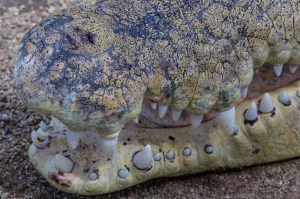
Sheba_Also 43,000 photos (CC BY-SA 2.0)
Crocs possess an incredible number of teeth, but their teeth cannot be labeled as the strongest. Why? Because they lose them now and then.
Mostly, crocs lose their teeth while biting their prey. These reptiles can exert a tremendous bite force, salties with 3700 psi, that can even crush a tortoise shell. And as a consequence of such a powerful bite, crocs lose some of their teeth.
In addition, crocodiles also lose their teeth while battling one another or due to a diet deficient in calcium. But they don’t bother them as people do. All thanks to their ability to grow a fresh set of immaculate pearly whites.
How often do crocodiles lose their teeth?
Have you ever seen a crocodile with some of its missing teeth grinning or smiling?
Researchers have examined crocodiles kept in captivity and found that they lose at least a couple of teeth each month.
Do Salties lose their teeth?
Since the dinosaur era, over 200 million years ago, crocodiles have existed. And if one crocodile species is feared the most, it is the saltwater crocodile.
Like other crocodilians, saltwater crocodiles, or salties, lose their teeth over time. Underneath the external tooth is a backup tooth that serves as the missing tooth’s replacement.
Saltwater crocodiles can have up to 66 teeth at once but frequently lose them during hunting and fighting. However, salties, who are polyphyodont, substitute their entire teeth set every 20 months.
How many times can a crocodile replace its teeth?
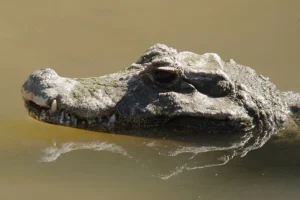
As we stated, crocodiles are polyphyodont. This is because they replace their teeth once they lose them. But do we know how many times a croc can replace its teeth?
A crocodile can replace its teeth throughout its lifetime. And even if they do not lose their teeth while hunting and fighting, they replace their entire (old) teeth every 20 months. However, this rate starts decreasing once the crocodile reaches 50.
Experts state that after reaching 50 years, a crocodile’s ability to replace its teeth decreases from every 20 months to every 3-4 years. So, despite getting old, crocs never run out of teeth until the very last day of their life.
Do baby crocodiles have teeth?
Unlike many other baby animals, baby crocs look pretty wild and exhibit traits that match their appearance.
Crocodile babies have an egg tooth on their upper jaw that they use to break out of their shells. Besides that, their teeth continue to erupt as they mature. However, the species they belong to would determine how many teeth they would have.
However, did you know that the “egg tooth” is not actually a tooth? Yes, it is an adapted (toughened) piece of skin formed during the embryonic development of the epidermis. When the time is right, the baby crocodile rubs the egg’s inner membrane using its egg tooth. In doing so, the hatchling forces itself out of the shell by breaking it from the inside.
Baby alligator teeth
Similar to crocodiles, alligators astonish us with their distinctive tooth structure. So let’s explain what baby alligator teeth are.
Baby alligators hatch with a full mouth of sharp teeth although, at the time of hatching, they are born with an egg tooth. This egg tooth, however, falls off eventually. A baby gator is born with 74-80 sharp teeth. These teeth make it easier for baby gators to slice through flesh.
However, it might intrigue you to learn that gators swallow their prey whole despite having so many teeth. The reason behind this is simple- their teeth are not meant to chew food. The same can be stated for baby gators as well. They also use their teeth to tear off the flesh and swallow it whole.
Summary
So, there you have it- crocodiles and alligators grow back their teeth. They are polyphyodont creatures, and one of their distinguishing features is the presence of successive sets of teeth. So, we may never see a crocodile with lost teeth. However, compared to their salad days, these reptiles’ ability to regrow their teeth slows down as they age.


